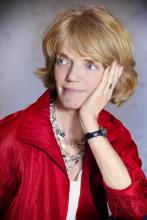Patricia Smith Churchland is a Canadian philosopher who has been a leading advocate of the neurobiological approach to understanding human consciousness, ethics, and free will. Teaching at the University of California, San Diego, since 1984, she has been a leader in the interdisciplinary project of combining psychology, philosophy, and neuroscience in research on the mind.
Born in 1943, Churchland earned her bachelor’s degree at the University of British Columbia in 1965 and then a master’s at the University of Pittsburgh the next year. She attended Oxford University, where she completed a B.Phil. in 1969. She began her teaching career at the University of Manitoba, and in 1982 spent a year as a visiting member of the Institute for Advanced Study, Princeton. After moving to San Diego, she became an adjunct professor in 1989 at the nearby Salk Institute and since 1999 has been the University of California President’s Professor of Philosophy. She has received an Honorary Doctor of Letters from the University of Victoria in 1996 and an Honorary Doctor of Law from the University of Alberta.
Churchland’s first book was Neurophilosophy (1986), which presented the case for an interdisciplinary approach to questions about how the mind represents, reasons, decides, and perceives. In collaboration with Terry Sejnowski, she worked for several years on building a “theoretical apparatus” for brain researchers to bridge the gap in understanding between lower and higher levels of brain organization. Her findings and proposals were presented in the 1992 book, The Computational Brain, suggesting a neural-computational model.
She has described her work as investigating the “impact of scientific developments on our understanding of consciousness, the self, free will, decision making, ethics, learning, and religion and issues concerning the neurobiological basis of consciousness, the self, and free will, as well as on more technical questions concerning to what degree the nervous system is hierarchically organized, how the difficult issue of co-ordination and timing is managed by nervous systems, and what are the mechanisms for the perceptual phenomenon of filling-in.” Churchland has received an array of research fellowships and grants, and has served as past president of the Society for Philosophy and Psychology and the Pacific Division of the American Philosophical Association. She has also been on the board of governors for the Philosophy of Science Association and the Canadian Philosophical Association.
Churchland has been a prolific contributor to journals. She has been published in Science, Nature, Proceedings of the Philosophy of Science Association, Annals of the New York Academy of Science, Biology and Philosophy, Daedalus, Scientific American, and New Scientist, in addition to several journals dedicated to neuroscience and to the study of consciousness. She has been editor of several book collections of essays, and has contributed chapters to several anthologies and to science or philosophical dictionaries, such as the Oxford Handbook of Philosophy and Neuroscience. Her monograph books include Brain-Wise: Studies in Neurophilosophy (2002); On the Contrary: Critical Essays 1987–1997 (1998), a collection of writings by she and her husband, Professor Paul M. Churchland; The Computational Brain (1992); and Neurophilosophy: Toward a Unified Science of the Mind-Brain (1986).



